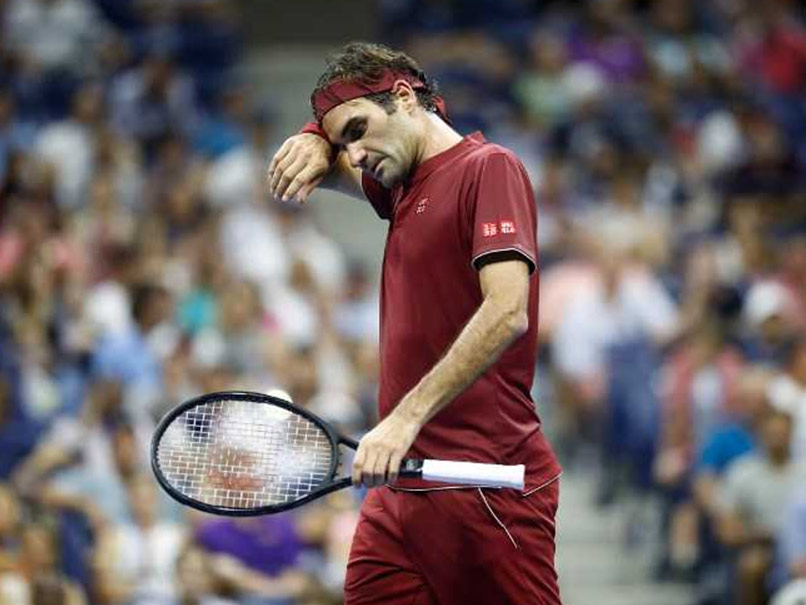Wednesday
Father Time, they like to say in sports, is undefeated, and after Roger Federer lost to journeyman John Millman Monday night, I finally had to concede the fact. Watching the most beautiful shotmaker in tennis history miss balls he normally makes in his sleep, I felt l was witnessing a kind of death. [Update: I felt similarly when Rafael Nadal withdrew from his semi-final match with knee issues, his second withdrawal from a major this year.]
To be sure, reports of Federer’s death have been exaggerated in the past. Four years ago I thought his days of winning majors were over, only to see him win three titles during the past year and a half and even reach #1 in the rankings for a few weeks. Maybe I shouldn’t panic yet. But I can’t help feeling that the last two years Federer has been in remission, his slide into Father Time’s clutches masked by his amazing racquet skills and serve placement. I compare this period of Federer’s career to the illness described in Turgenev’s Fathers and Sons, which I’ve just completed: although the end signs are there, a brief period of recovery raises hopes, only to give way to the inevitable end.
Bazarov, a scientist and the son of a country doctor, has contracted typhus from an infected cadaver he has been dissecting. Although he and his father both know that it’s all over, like me with Federer his father can’t acknowledge the danger signs:
Bazarov abruptly turned round on the sofa, looked fixedly with dim eyes at his father and asked for something to drink.
Vassily Ivanovich gave him some water and in so doing felt his forehead; it was burning.
“Listen, old man,” began Bazarov in a slow husky voice, “I’m in a bad way. I’ve caught the infection and in a few days you’ll have to bury me.”
Vassily Ivanovich staggered as though someone had knocked his legs from under him.
“Evgeny,” he muttered, “what are you saying? God have mercy on you! You’ve caught cold . . .”
“Stop that,” interrupted Bazarov in the same slow, deliberate voice; “a doctor has no right to talk like that. I’ve all the symptoms of infection, you can see for yourself.”
“What symptoms . . . of infection, Evgeny? . . . Good heavens!”
“Well, what’s this?” said Bazarov, and pulling up his shirt sleeve he showed his father the ominous red patches coming out on his arm.
Vassily Ivanovich trembled and turned cold from fear.
“Supposing,” he said at last, “supposing . . . even supposing . . . there is something like an infection . . .”
“Blood poisoning,” repeated Bazarov severely and distinctly; “have you forgotten your textbooks?”
“Well, yes, yes, as you like . . . all the same we shall cure you!”
“Oh, that’s rubbish. And it’s not the point. I never expected to die so soon; it’s a chance, a very unpleasant one, to tell the truth. You and mother must now take advantage of your strong religious faith; here’s an opportunity of putting it to the test.”
So that’s Federer after he stopped winning majors the first time. Now here’s the past year and a half:
Towards the morning he felt a little easier. He asked Arina Vlasyevna to comb his hair, kissed her hand and swallowed a few sips of tea. Vassily Ivanovich revived a little.
“Thank God!” he repeated, “the crisis is near . . . the crisis is coming.”
“There, think of that!” muttered Bazarov. “What a lot a word can do! He’s found one; he said ‘crisis’ and is comforted. It’s an astounding thing how human beings have faith in words. You tell a man, for instance, that he’s a fool, and even if you don’t thrash him he’ll be miserable; call him a clever fellow, and he’ll be delighted even if you go off without paying him.”
This little speech of Bazarov’s, recalling his old sallies, greatly moved Vassily Ivanovich.
“Bravo! splendidly said, splendid!” he exclaimed, making as though to clap his hands.
Bazarov smiled ruefully.
“Well, so do you think the crisis is over or approaching?”
“You’re better, that’s what I see, that’s what rejoices me.
And now here’s last night, when Federer couldn’t make a first serve to save his life and netted routine volleys. When, frankly, he looked old:
The change for the better did not last long. The disease resumed its onslaughts.
Of course, winning the Australian Open twice and Wimbledon once during your period of remission is nothing to sneeze at. Still, the past few months had Fed fans believing that age was no obstacle and that his sublime skills could carry him at least a little further. Then last night happened.
Maybe it is my own mortality that I mourn.


